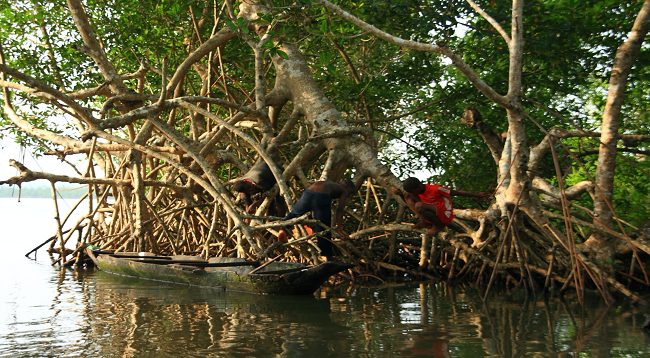Mangroves are critical ecosystems in coastal protection, biodiversity conservation, and climate regulation. In Nigeria, these unique forests are predominantly found in some coastal states.
As climate change exacerbates environmental challenges, Nigeria must recognise and enhance the importance of mangroves as nature-based solutions.

In this article, I will discuss strategies for fostering these ecosystems, present recommendations for the Nigerian government, and highlight international collaborations.
Mangroves serve as a buffer between land and sea, protecting coastlines from erosion and storm surges. They also provide habitat for numerous species, including fish, birds, and crustaceans, which are crucial for the local fishing economy.
Furthermore, mangroves act as carbon sinks, sequestering significant amounts of carbon dioxide and thus contributing to mitigating climate change.
In Nigeria, the degradation of mangrove ecosystems threatens biodiversity and the livelihoods of coastal communities.
Despite their ecological importance, Nigeria’s mangrove forests have suffered severe degradation due to urbanisation, oil spills, deforestation, and unsustainable agricultural practices.
According to the Nigerian National Biodiversity Strategy and Action Plan, the country has lost approximately 70% of its mangrove cover over the past few decades. This loss impacts biodiversity and exacerbates the vulnerability of coastal communities to climate impacts.
To foster the importance of mangroves, the Nigerian government should prioritise awareness campaigns and educational programmes. Collaborating with local communities, NGOs, and educational institutions can ensure that the public understands the ecological and economic benefits of mangroves.
Programmes could include workshops, school curriculums, and community outreach initiatives aimed at promoting conservation efforts.
The Nigerian government must strengthen its legal frameworks to protect mangroves from exploitation. This includes enforcing existing environmental laws and creating new regulations that specifically address mangrove conservation.
Additionally, involving local communities in the decision-making process can empower them to take ownership of mangrove protection efforts.
Restoration of degraded mangrove areas is essential for rejuvenating these ecosystems. The government can collaborate with international organisations such as the Food and Agriculture Organisation (FAO) and the United Nations Environment Programme (UNEP) to implement restoration projects.
These initiatives should focus on native species replanting, community involvement, and monitoring the health of restored areas.
Integrating mangrove conservation into national climate policies can enhance their role as nature-based solutions. The Nigerian government should prioritise mangroves in its climate action plans and seek funding from international partners.
Programmes like the Green Climate Fund can provide financial resources for projects aimed at conserving and restoring mangrove ecosystems, and the Small Grants Programme can also be a successful solution in boosting mangrove initiatives across the countries.
International collaborations can provide technical expertise and funding for mangrove conservation in Nigeria. Partnerships artnerships with organisations such as the World Wildlife Fund (WWF) and the International Union for Conservation of Nature (IUCN) can facilitate knowledge exchange and promote best practices in mangrove management. These collaborations can also enhance Nigeria’s visibility in global environmental discussions.
Engaging local communities in mangrove conservation is crucial for sustainable management. The government should support community-led initiatives that promote sustainable livelihoods while protecting mangrove ecosystems. These initiatives can include ecotourism, sustainable fishing practices, and alternative livelihood programs that reduce pressure on mangrove resources.
Establishing a robust monitoring system to assess the health of mangrove ecosystems is vital. The Nigerian government can collaborate with research institutions to conduct studies on mangrove biodiversity, carbon storage, and the socio-economic benefits of mangroves. This data can inform policy-making and conservation strategies, ensuring that efforts are evidence-based.
Fostering the importance of mangroves in Nigeria requires a multi-faceted approach that involves awareness, legal reform, restoration, community engagement, and international collaboration. By prioritising these strategies, the Nigerian government can significantly enhance the ecological and economic benefits of mangroves across the nine coastal states.
Protecting mangroves is not just an environmental necessity; it is a pathway to sustainable development and climate resilience for Nigeria.
To implement these strategies effectively, the following recommendations are proposed:
- Launch nationwide awareness campaigns about the importance of mangroves.
- Strengthen legal frameworks to protect mangrove ecosystems.
- Initiate restoration projects in collaboration with international organisations.
- Integrate mangrove conservation into national climate policies.
- Foster community engagement in conservation efforts.
- Establish a monitoring system for mangrove health and biodiversity.
Nigeria can lead the way in utilising nature-based solutions to address environmental challenges and promote sustainable development
By Olumide Idowu, Founder/CEO ICCDI Africa
